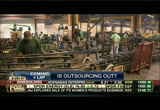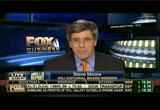tv The Willis Report FOX Business January 25, 2013 6:00pm-7:00pm EST
6:00 pm
benefit guarantee corporation, a government agency, and it sounds like your pension is guaranteed. in fact, it's right in their name, but guess what, it's not guaranteed. it's a bloated group losing billions of dollars each and every year, and it looks like they need a taxpayer bailout if things do not change, and soon, but back to yoou. if your mployer goes under, they dump the pension on to the government agency, but the rules changed, and depending upon how much you are owed, you may just get very small portion of it. crepts on the dollar. ask the employees of pilots from united or delta who get just a small portion of what they were promised, so don't believe the name or the guarantee. promises made to you may be broken, and i don't want you snick snickered -- snickered by the misleading name of this agency. melissa? melissa: thanks, see his show this weekend on saturday and sunday. also, be sure to catch my
6:01 pm
exclusive interview with illinois state treasurer on monday. he's going to come on to take about illinois' lowers credit rating. a big story monday, 1 p.m. eastern here on fox business. thanks to both of you. have a wonderful weekend. happy friday to everyone out there. see you back here monday. ♪ gerri: hello, everybody. i'm gerri willis, and tonight, on "the willis report," the mutual fund industry wants to punish you for taking out your own money, trillions of dollars at stake. will you pay more this weekend for using a credit card rather than cash? find out. and, illegal immigrants are not supposed to get medicare, but a new report says, yes, they can. "the willis report" is on the case. ♪
6:02 pm
all that and more coming up later in the show, but, first, our top story, a new warning for investors tonight. if federal regulators get their way, you can soon end up paying a big fat fee for withdrawing your own money from your money market mutual funds. currently, there is no fee. the feds say it's all in effort to reform the $2.7 trillion money market mutual fund industry which 61 million retail investors are a part of. regulators say they are going too far. senior washington correspondent peter barnes joining us now. peter, what is the industry proposing tonight? >> well, gerri, this all goes back to this whole break the buck problem we saw back in 2008 when the rereceiver fund went below a dollar because it invested in lehman brothers'
6:03 pm
short term debt. there's an an effort since to stabilize money market funds. regulators purring some of this, got some reforms in 2010. the industry said the 2010 stuff they did has been fine, but yesterday, we actually saw the industry move, and back a couple of new proposals. one would be to prevent -- to shut down redemptions for a short period, a gate idea is what it would be, but the big one that you're talking about here is a 1% redemption fee for people who really needed to get their money out for, you know, for like a 30-day period, might charge 1% to stabilize the fund to ensure there was not a fire sale and value didn't drop below a dollar. this is the first time the industry moved here, and that would mean if you want the money, you have to pay a dollar
6:04 pm
to get the money back. gerri: not the point, of course. peter, thanks for coming on tonight. we appreciate your time. >> okay, gerri. gerri: thank you. critics of the new rules are worried about regulation overkill. joining me now, the president of capital management and greg mcbride, senior financial analyst for bankrate.com. greg, starting with you. is this overkill? >> i think it is, gerri. i mean first of all, the apeople -- appeal here to individual investors, it's not high return. you can get to the money when you need it and for every hundred dollars you put in, you get a hundred dollars out when you need it. if you take they way or restrict those appeals, frankly, people have alternatives to put the money elsewhere, in a nonlife savingsing the or short term bond fund where, you know, they can go, oh, by the way, get better returns than what they get in the money funds right now. gerri: greg makes the right
6:05 pm
point here. if you want to be in cds, have the money tied up, whatever, you could, but people are in money market funds because they want to be able to get out whenever they need that money, and it seems to me at the very point in time they make restrictions getting out, whether it's financial restrictions or closing the temporary gate, that's exactly what you want to get access to it, in an emergency. what do you say? >> it's a mistake all the way around. first off, money markets right now pay 0%. if they paid 5% like back in 2006, and they wanted to take a percent of you a different story, yoir not making money off the money markets right now, so it would be a loss. number of two, the gate idea is stupid. let markets bement if you get another market crisis and tell people, oh, you can't get out of the funds right now, when they open the funds to get out of them, everybody's going to jump at once, and there's even a bigger problem.
6:06 pm
they are going to create a motions and more worry than they are in for. it's a big mistake. gerri: always the unintended consequences, isn't is it? the thing you don't mean to do that gets you in trouble with regulations. greg, to you, respond to this. christopher donohue speaking out on the issues saying this regulation will kill the industry, kill the industry. he was on our air today, chris donohue, fed rated ceo, saying they have had a club since the 1970s trying to kill them. change to the rules causes money to move from money market funds into other instruments. what do you think of this? i mean, it's sort of, as you pointed out at the top of the block, it's the point of the industry to get in and get out, to be perfectly liquid. if you remove that, does that mean everybody goes somewhere else? keep in mind here, we talked about lots of american investors, but it's also companies. it's also pension funds.
6:07 pm
governments are in these money market funds. it matters very much what happens to them. >> you're absolutely right, gerri. i explained this to someone the other day, and he said the cure is worse than the disease. that sums it up. the money funds are safe, okay? they are not guaranteed, but they are very safe breaking the buck with the frequency of haley 's comet. this causes institutions to put money elsewhere has a detrimental effect because companies rely on being able to issue short term debt in the money market so that they can buy inventory, meet payroll, and that's why they stabilized the money funds back in 2008 to begin with which, by the way, didn't cost taxpayers a dime. gerri: bringing you to the topic now, which is, you know, okay -- other people, you know, people
6:08 pm
who support this would say at the end of the day the government doesn't have to stand behind the funds. taxpayer dollars at risk. who is right? >> well, when all is said and down, money flows where it's treated best, and when you start puts fees and regulations in the money, it's going somewhere else. we can talk blue in the face what's right and wrong, there is a competition for money on a daily basis from so many areas of the markets whether it's equities, bonds, you name it. if they pull this, i promise you money flows from the money market funds, and a bunch will shut down. you just don't want to put gates on markets, especially in times of stress. when there's stress and people are emotional, and you tell people you can't get your money, well as soon as you open up those gates, they are going to
6:09 pm
run for the hills, and that's where problems arise. i don't think they thought it through. it's people all about regulations and fees, and they need to start thinking twice before coming up with something like this. gerri: greg, what's the right solution? should there be a regulatory solution? >> they have done enough. the reforms put in in 2008 require funds to hold short term instruments, not only does that undercut yields, but, again, don't have a knee jerk reaction designed to avoid the last crisis. money funds are very safe investments. they break the buck with very, very rarely, and, you know, investors very rarely lose money because in a lot of the cases, the fund companies themselves step up and make investors whole so, again, i think this is overkill. i don't think -- i think the best solution here, gerri, frankly, is no solution. gerri: no solution. gary, i have to ask because it's up your alley. so you remember the financial stability oversight council; right? a group of brain yaks who were
6:10 pm
to see the next problem coming, and they work for the government, and so the things they have been considering are floating asset values on money market funds, hold backs, and capital buffers, so how much confidence do you have in a government authority that's supposed to see around the corner and see the next problem that's going to blow up on wall street? >> well, look, i've been yelling and screaming for years the people that have watched and overseen things and basically caused a lot of the problems, and now the ones that are supposedly going to come up with the solutions to the problems, that worries the heck out of me. again, i'm a big believer in free markets. let them be, let them roll. people have to read the fine print on money markets to realize that even though they -- most of them stayed with just about all of them, they can come down. if in bad debt, people have to understand that. if you put all the things on top of each other and on top of each other, you are going to create a
6:11 pm
real big problem if we get into that situation again. by the way, a great point in the fact that during the worst stress seen in ages, only one mutual fund, the reserve fund, broke the buck at that time so i'm not as worried about these other people, and, again, the word most definitely in the situation is overkill. gerri: face it, the smartest minds on wall street did not see the housing bubble ready to burst. they didn't see the dot-com bubble, they miss a lot of things. guys on a board somewhere in washington, d.c. can see what the next problem is going to be, i don't buy it. >> we watch for two years as ben bernanke said sub prime lending is fine and housing won't hurt the economy. if the head of the fed can't get it right, i doubt the brains trying to come up with rules and regulations have any idea, and i don't think if they know what the news is next week. i don't put any creens into them. >> you know, if you are an
6:12 pm
investor and have money in the money market funds, follow the story. it could be meaningful to you. gary, greg, thanks for coming on. great to have you here. appreciate your time. >> thanks. >> thanks, gerri. gerri: strong earnings report sent stocks higher today on wall street after breaking through 1500 yesterday for the first time since 2007, the streak of gains in eight days, the longest in 2004, hurray, and the dow in spitting distance of 14,000. the nasdaq posted gains today despite another down day from apple. exxon is the most valuable company by market cap. apple's stock on the decline from earlier this week dropping 2 two more percent today. thanks to the oil giant, there's a market cap of $5 billion higher than apple. that's big. a lot more still to come in the hour including how more waste, fraud, and abuse in washington
6:13 pm
is leading illegals and inmates, prison inmates, to get your money, and, first, your paycheck goes down, and the cost of everything you buy goes upstart b -- up starting sunday, the surcharge on your credit cards coming up. ♪ this is $100,000. we asked total strangers to watch it for us. thank you so much. i appreciate it. i'll be right back. they didn't take a dime. how much in fees does your bank take to watch your money? if your bank takes more money than a stranger,
6:16 pm
gerri: yesterday, told you about a new fee that could be imposed by retailers if you buy with a credit card anywhere. now, the so-called swipe fee, could be as much as 4% of the cost of your purchase, the money would pay for the cost of processing your credit card transaction. here's how a couple of the guests last night reacted. >> this is really bad news for consumers. we're already nickeled and dimed to death, and we're going to be nickeled and dimed more. >> i'm a free market guy, and i
6:17 pm
believe individual stores have a right to charge me three dollars for coffee if they want to, but the consumer can say if you charge me extra, i'll take my business elsewhere. gerri: thumbs up or down for the fee? both of you, see your thumbs. nobody likes it. nobody libs -- likes it. >> i have a different finger i want to use, but i'm not allow to. gerri: they are not fans, and neither am i. the last thing we need is another fee. nobody wants to see a surcharge on the credit card bill, and you guys weighed in with heated responses. here's an e-mail from chris. he says 4% on top of what ever you pay by using your credit card? we are already getting squeezed by higher food prices k an now it's 4% more to use the credit card? what economy is it? nickeling and squeezing every penny from the consumer. i'm thumbs down and want to use the other finger to the retailers, actually, times two.
6:18 pm
in terms of a class action lawsuit settlement, it's spelled out clearly that retailers who plan to charge must notify consumers of their plans to surcharge so, today, we decided to find out who might raise these tabs. target told us no. here's what the spokesman said, quote, target has no plans to charge guests who use credit and debit cards to allow visa and master cards to continue charging unfair fees. no love lost there. other big chains contacted agreed with target, a couple of them responded to us. we heard from a smaller merchant who said, i would like to know if you've seen a merchant processing statement from a credit card processer breaking down the fees paid to process credit cards. you would understand the difficulty we face as small business. we are the ones paying for the reward cards. that's true, suzanne. we talked to a big one in retailing, the national retail federation who had this to say, "the concept that mother --
6:19 pm
merchant charge for credit card use is misinformation spread by the card industry. the lawsuit was brought by merchants to bring down swipe fees, and in turn, the prices paid by consumers not to increase the amount paid by consumers surcharging, therefore, runs 180 degrees to the intent of the suit. there's always exceptions, merchants, in general, have no intention of surcharging." it's the last part that bothers me just a little bit. they say there may be exceptions. according to the federation, big chains have a difficult time levying the fee because if any of the operations are in any one of the ten states seen here highlighted in yellow, they don't have to pay the surcharge. they can't charge it, and they can't charge at any of the stores. even so, a big grocery store chain says it's weighing what to do saying we continue to explore ways to insent vise customers to use lower cost forms of payment,
6:20 pm
and they have not made any final decisions. experts believe you'll be most likely to see the surcharges smaller merchants, bodegas, little storesment again, the little guy and the little business guy or gal gets the shaft. my advice to you this weekend is that you scan all your receipts to see if you're charged a fee for credit card processing. hard pressed to return to a mother chapter where i got that surcharge. coming up later in the show, the man who brought the business back to the u.s. from china, and he tells us his story. next, your tax dollars going to ill leal immigrants and prison inmates. the results of a shocking new report. ♪ ♪
6:21 pm
[ male announcer ] how do you make 70,000 trades a second... ♪ reach one customer at a time? ♪ or help doctors turn billions of bytes of shared information... ♪ into a fifth anniversary of remission? ♪ whatever your business challenge, dell has the technology and services to help you solve it. whatever your business challenge, (announcer) at scottrade, our cexactly how they want.t with scottrade's online banking, i get one view of my bank and brokerage accounts with one login... to easily move my money when i need to.
6:22 pm
plus, when i call my local scottrade office, i can talk to someone who knows how i trade. because i don't trade like everi'm with scottrade. me. (announcer) scottrade. awarded five-stars from smartmoney magazine. we all work remotely so this is a big deal, our first full team gathering! i wanted to call on a few people. ashley, ashley marshall... here. since we're often all on the move, ashley suggested we use fedex office to hold packages for us. great job. [ applause ] thank you. and on a protocol note, i'd like to talk to tim hill about his tendency to use all caps in emails. [ shouting ] oh i'm sorry guys. ah sometimes the caps lock gets stuck on my keyboard. hey do you wanna get a drink later? [ male announcer ] hold packages at any fedex office location. gerri: you'll never believe who is on the receiving end of your taxpayer dollars, and how millions is wasted on medicare. details in 60 seconds.
6:24 pm
gerri: taxpayer dollars hard at work providing medicare services to illegal immigrants and prison inmates, may friends. according to a new report by the health and human services inspector general, totaled more than $125 million between 2009 and 2011, and joining me now, dr. scott, resident fellow at the american enterprise institute. doc, welcome back to the show. good to see you. how does this happen? doesn't the government know who they are sending checks to? >> well, the answer is no, medicare doesn't have systems in place to make sure the payments made are appropriate. they were inproper payments, about $65 billion a year in improper payments, different than fraud. gerri: 65 billion? just as if this is a normal thing that happens, and, boy --
6:25 pm
why can't they -- what's the problem? >> a structural problem how medicare is ensured appropriately em posing paperwork, requiring providers to document things to be paid and audit the charts. in this case, the providers didn't know they provided services for people who didn't know they were getting services, and in a lot of cases, if they commit fraud, they lie in paperwork. if they are just going and auditing paperwork, documentation that doctors have to make to bill for certain things, if you are ripping off the program, you lie in the paperwork. gerri: maybe it was your comments on this, actually. use certain language if you know what you are doing, know what to call in the language of medicare; right? people who are fraud steers know that easy peacey, use the right language, you get the money. >> if i transfuse the patient, blood loss, i write "blood loss," and bill medicare. if you don't right that, you're
6:26 pm
not paid. people know what to write in the charts. gerri: all right. so let's just be clear about this. it's illegal under federal law for this money to go to illegal immigrants or to prison inmates. right? >> right. gerri: people think, oh, there's some cases where they can get benefits, but it's illegal. talking about the law having been broken, but at the end of the day, the federal government, center for medical services says they will not go after money going out the door in this way and go after the service sprieders for illegally giving this money out or after the people, themselves, why? >> well, because medicare has responsibility for making sure the claims in are appropriate claims and appropriate for getting paid. they try to put in the responsibility on the providers in the hospitals and doctors, but in some cases, they can't certify whether they are medicare eligible, filing the claim, and if they pay the claim, medicare had a data base to check these things, slow to
6:27 pm
do it. this is what happens when you administer a large program from washington. gerri: never going to see the money again, are we? >> probably a lot of it we will not. gerri: that's not good news. any way to fix it? >> medicare would be more active than investigating what's paid for. looking at the private health care plan, they employee hundreds and thousands of providers, clinicians to audit and look for waste, fraud, and abuse, and medicare just has paperwork audits. gerri: they'll never know the real problem. scott, great to have you here. appreciate the time. nice to have you on set. i like that. >> thanks. gerri: the louisiana governor has harsh words for his party, and is outsourcing on the way out? has it become profitable to make things right here in the good old us of a? indidn't look -- in-depth look is coming up. ♪
6:29 pm
6:31 pm
>> from our fox business studios in new york, here, again, is gerri willis. gerri: jobs coming back to u.s. shores? u.s. economy slowly gaping momentum, finally, so are companies turning away from offshoring american jobs? joining me now, mark coopersmith, director of et water systems, allen from the u.s. bids and industry council research, and harry, founder and president of the reshoring -- can't say the word, reshoring initiative. mark, starting with you. your company was in china. you came back to the state. why? >> we came back to the states. i joined the company three years ago, and we looked at where the
6:32 pm
products were made, getting the quality needed, and how were we servicing the customers. we did a comparison of chinese manufacturing where we were making the products, and u.s. manufacturerring, and we were surprised at the results. the results were close, and we then dove in and made the decision to reshore production from china to the u.s.. gerri: harry, you next. a survey from boston consulting show 48% of manufacturing companies with annual sales above $10 million reshored. is this a trend? >> definitely. we calculate that about 50,000, so 5-0-thousand, manufacturing jobs reshored in the last three years, 10% of the growth in manufacturing in the last three years. there's other surveys by mit and my mfg.com that have resulted similar to what you quoted. gerri: allen, you don't see the
6:33 pm
trend, why? >> not at all because the best national level and global data we have including trade balances, including import penetration rates and u.s. manufacturing including global market share for manufacturing is telling us loudly and clearly that for all of these individual antidepressant dotes -- antidotes told on reshoring, the united states, if anything, loses competitiveness as a location for manufacturing. gerri: all right. mark, to you, once you came back, what did you experience in the country in the competitive positioning? >> so that's a great question. so let me preface that we're a green technology company helping large water users conserve water through a lot of technology. we have complicated electronics that we communicate to wirelessly and through software,
6:34 pm
and when we looked at the product line and we were looking for partners to help us with that. it started with innovation. when we wanted to accelerate the pace of innovation to understand what was going on right here in silicon valley at the heart of this great ecosystem of entrepreneurship and technology, we started there and collaborated with a great manufacturing partner that we've been working with for three years to really relaunch an update our products and launch new innovative products. gerri: turning to the profitability, did it help moving back? >> so here's what we found. we found that the costs were surprisingly close, at least for us, at least for where we were, incorporating costs like transportation, rising costs of chinese wages, and others. we were surprised at the difference was very slight. then we started looking at
6:35 pm
quality. we looked at just in time manufacturing. we ship directly from the manufacturing plant to our customers. we get better service. we touch the products less. margins have more than tripled since we brought manufacturing back to the u.s.. i can't say all of that is due to reshoring. gerri: allen for a second, these are the scenes i've seen in researching the topic that transportation costs are through the roof, and china's a long way from many people's markets, a, and, b, the cost of chinese labor has risen dramatically, huge delta, and american wages flattened out. as a result, ge, ford, otis, companies coming back into the country, do manufacturing here. isn't that the beginning of a trend? don't you see a trend there? >> no reason, gerri, sorry to tell you, but there's slotly -- absolutely no reason at this point to have a significant trend in the making or that these are anything more than drops in the bucket, and, in fact, let's talk chinese wages
6:36 pm
for a second, and even transportation costs. there's little doubt that production costs in china are going up. nobody denies that, although, there's big questions as to how much, but here's what else is going on in china, what everybody seems to miss. chinese productivity is going up faster, and everybody knows, except it seems when they talk about china, that when companies get more productive, they can absorb higher costs and maintain and increase profits. gerri: jump in here, is that right or missing something? >> allen east right that the -- from 50,000 feet where allen's looking, the flows are balanced or even maybe favoring offshore. >> balance is the key. >> there's a deficit. >> yeah, allen, my turn. the key fact is that reshoring that was happening at a zero rate three years ago accumulated 50,000 jobs, and, therefore, allen can still see that there's net offshoring happening, but
6:37 pm
reshoring is happening, and when you start from zero and get to something, that's a trend, and the trend will continue, and the trend will grow. >> harry, it's never zero. gerri: guys, leaving it there. going to leave it there. fascinating consideration. allen, hey, wait and see if this is going to pick up. >> we'll wait and see. hope it will. gerri: thank you to all of you for coming on tonight. mark, allen, harry, great conversation. thanks so much. >> thank you. gerri: what do you think? here's the question tonight. would you spend more to buy made in america? log on to our website, vote on the right side of the screen, and share the results at the end of the show. buying made in america is not the only thing to watch for. many products don't do whey that claim. truth in advertising. you know what? there's not always truth in advertising. in tonight's top five, the most misleading product claims, according to the federal trade commission, number five, siri,
6:38 pm
this is so right. apple claims the voice recognition software, quote, understands what you say and knows what you mean. my husband doesn't even do that, but how many times have you shouted "no" after she asks if it's right? number four, walnuts, believe it or not. diamond foods in california claimed the nuts prevented strokes and cured depression. they were magic nuts. the company settled a lawsuit for more than $2.5 billion. number three, five hour energy, living essentials promises you have energy with no crash, but a survey shows a quarter of users experience extreme crash. the product may also kill you, at least the fda is investigating. sketchers shapeups. remember that? any product that helps you lose weight without dieting is a crock my friends, but these sneakers promised that, and the company's forced to shell out $40 million as a result.
6:39 pm
can you guess the number one misleading product claim? pom wonderful claim that the juice helps you cheat death. cheat death, my friends, prevents alzheimer's, cancers, heart attack, stroke, and prevents aging. bring it on. i want some of that. eight ounces a day is 5u8 you need. you have to have your head examined if you believe that. that's what i say. coming up later in the show, when we come back, did president obama break the law? find out what the judge had to say, and, next, one the nation's most prominent republicans telling the party to stop being stupid. is he being fair? come back with us. ♪
6:43 pm
gerri: is it time to rebrand the republicans? top republican governor of louisiana giving his own party harsh advice, don't be stupid. with that, board of the "wall street journal," steve, thank you for being on. i want to play this for you to respond. >> okay. >> we've got to stop being the stupid party. [laughter] i'm serious. it's time for a new republican party that talks like adults. we had a number of republicans that damaged the brand this year with offensive and bizarre comments. we had enough of that. gerri: what do you think of that? >> well put, about time somebody like bobby spoke out about the republican branding problem, and, you know, the republican party, look, i'm embarrassed to admit it, we're a republican, and we are the stupid party, doing stupid things over the last couple years. just to name a couple examples, republicans should never talk about abortion and rain in the same sentence. it doesn't work.
6:44 pm
gerri: a nightmare. >> a nightmare. the republicans have to learn how to speak spanish, quite seriously. they need to learn to reach out to a huge percentage of the population, a swing vote, no reason republicans can't be getting the hispanic vote, and, you know, gerri, one other point, you know the republicans lost the asian vote? an amazing thing when you think about it because the asians, as you know, they are ethnically the most wealthiest people in america, and, yet, there's something about the republican brand that they are turning off minorities in ethnic groups and not going to win election. gerri: every group apparently. >> exactly. by the way, you're my favorite business editors and hosts. you know it, you talk about it all the time. what's a company have? what's its greatest asset? the brand; right? if you blow away your brand, you're in big trouble, out of business so i say hall halleluj. gerri: a lot of the concerns and
6:45 pm
worry inside the party is that people can't get on the same stage. it's not a branding problem when half or more of the members of congress believe that the way we spend money is silly, and the other half thinks, well, you know, just keep spending, get along go along. >> that's true. gerri: that's not a branding issue, but a fact, a reality of a splintering in the party. what do you say? >> well, you know, i've been involved in politics, and i think they are more unified than they have been in ray long time. when i came in in the 70s, the republicans were all over the map, but now they are an anti-tax party. they are a pro-life party. they are a party that believes in limited government, but you're right. a lot of times they stray from that message, and the best evidence of that, the one that anows me so much is the vote taken on that obscene, you know, hurricane, the sandy bill, which was stuffed with pork.
6:46 pm
you know. you covered that story. how could the guys in good conscious vote for that and say they are fiscal conservatives. gerri: what's the problem taking out the ridiculous spending? >> exactly. gerri: a pentagon official cede said if sequester goes through, hundreds of thousands of civilian employees furloughed. what do you think? >> that's probably true. you know, and it's unfortunate, and i've been saying this for months that the sequester is not a good way to cut spending, but i hate to say it, could be the only way to get cuts in spending. we have to do this. look, you know it, we can't borrow 40 cents for every dollar spent, not a trillion dollars a year, it's unfortunate, people lose jobs. i live in northern virginia, people on the street i live will be affected by this, but you know what? business had to cut people; right? i mean, businesses got trimmed. they got efficient, and, actually, businesses, as you
6:47 pm
know, you just covered the story, united states is the place to live best in. why can't government be efficient like private industry does? gerri: we can dream, steve. by the way, you are one of my favorite guests of all time. i have to say that. thanks for bringing your smart comments. >> have a great weekend. what's the new word about shoring? reshoreing. that's great. gerri: can't get my brain around it. >> it's great. new term. have a great weekend. gerri: unintentional as usual. appreciate your time. two crepts more on a possible scary food situation coming up soon, and if you have not had a bad day and want to complain about the boss, should you do it on facebook? don't be stupid. we'll have the legal panel in next. ♪
6:48 pm
6:49 pm
6:51 pm
6:52 pm
joining me is the criminal defense attorney and fox news legal analyst. okay. we have two cases here. i'm going to summarize them quickly. one is a social services provider, and there's a worker there who gets in trouble and complains about workers online. this results in her getting fired, and a bunch of people fired. all the details here, but there's an example of a reporter, a newspaper reporter, who complains about his job on facebook, and gets in trouble that way. they side with the workers in both cases. one of the employers private, the other public. who do you side with in these cases and why? >> well, okay, the first case here, we have a caseworker, a social service provider, and exactly that, goes on the web, and gets colleagues to talk to the employer, and they get explicit and it's ugly.
6:53 pm
nasty words about the working conditions. here's the key. it was about working conditions. it was not about people. it was about people in the sense, that, yeah, the working conditions, but, you know, and bosses, good or bad, but primarily working conditions. the nlrb said in that case she should not have been firedded because it was about working conditions, and the case law's clear about that that we have a right as employees to talk about working conditions if they are unfair. gerri: do you agree? >> i think this is really different because this is a governmental agency, and it's not the same as a private business, okay? a governmental agency has to go through a bunch of red fap in order to fire someone. you have all of these procedures. you can't just fire someone for saying anything. there's reports, this, reviewed, and it's a protected class. they are a protected class. when you bring a complaint, and it's a protected class, that raises discrimination. that's not allowed.
6:54 pm
gerri: protected because she's hispanic; correct? >> absolutely. gerri: you think should can't be fired? >> should have been because of the disparaging remarks; however, she was not fire because she's his hispanic, a member of the protected class, and the laws kick into place. gerri: i don't think it was a protected class, what the nlrb says it was not about that, but because talked about workings, and that is something carved out with the, you know, with the disparagement of employers. if you're talking about legitimate working conditions, then -- >> do nose usually involve anger and exprettitives and cursing and saying bad things? that's not talking about working conditions. that's blowing off negative steam. it's not good. gerri: working conditions with exexpolicetives. gerri: agree to disagree.
6:55 pm
what do you think about the police report? the police reporter says he's talking about the job, the police beat and says, what, no overnight homicide, you're slacking, you stay homicidal, tucson. what do you think of this? >> i don't think any business should be encouraging murder, okay? that's what the guy is doing. maybe he was trying to be funny, watching anchor man or make a joke out of it, but it's not a joke. i mean, you don't know that kind of effect that will have on the reader. gerri: just complaining about the job. >> that's not complaining about the job, but saying commit a homicide so i can write about it. gerri: i don't know. there's so many ways, to fire the guy, no, he should not be even fired in this case. that it was okay, it was legal to fire him, sorry. to fire him over one comment like this, distasteful? absolutely. that's the thing, you bring the guy in and say, you know,
6:56 pm
really? i know you thought it was funny, but it's not funny. knock it off. you're not fired. >> i want to ask you this, that the guess 1 in his employee handbook, it says don't do stupid stuff like this, and if you're on social media talking without the job, ensure it's in a way to make us proud. doesn't he have an obligation to reflect well in front of public? that's what social media is, not five people watch, but a lot of people. >> absolutely. you're not supposed to invent the news. you're not supposed to go out and there encourage people to kill other people so you can write a story. i mean, that's bad for business right there. sorry. the employee needs to go. he's out. gerri: true, but the laws, the latest court decisions this week that came down saying you can go on facebook, and the employers manual, whether they say you can't disparage or not, talking about working conditions and things like that, you can, it's a first amendment right. >> sure. gerri: believe they are
6:57 pm
overstepping the bounds? >> i'm running a business, and i have somebody on facebook talking bad about my business, causing me to lose money, affecting the morality, i can't fire the tabi? gerri: i agree there. you have the right to free speech, i have a right to fire him. qid proquo. thanks so much for coming on tonight. >> sure. thank you. gerri: appreciate the time. thank you so much. we'll be right back. we all work remotely so this is a big deal, our first full team gathering! i wanted to call on a few people. ashley, ashley marshall... here. since we're often all on the move, ashley suggested we use fedex office to hold packages for us. great job. [ applause ] thank you. and on a protocol note, i'd like to talk to tim hill about his tendency to use all caps in emails. [ shouting ] oh i'm sorry guys. ah sometimes the caps lock gets stuck on my keyboard. hey do you wanna get a drink later? [ male announcer ] hold packages at any fedex office location.
6:59 pm
81 Views
IN COLLECTIONS
FOX Business Television Archive
Television Archive  Television Archive News Search Service
Television Archive News Search Service 
Uploaded by TV Archive on

 Live Music Archive
Live Music Archive Librivox Free Audio
Librivox Free Audio Metropolitan Museum
Metropolitan Museum Cleveland Museum of Art
Cleveland Museum of Art Internet Arcade
Internet Arcade Console Living Room
Console Living Room Books to Borrow
Books to Borrow Open Library
Open Library TV News
TV News Understanding 9/11
Understanding 9/11


























































